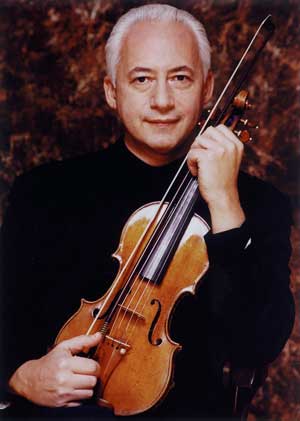Spivakov, Moscow Virtuosi bring boisterous energy to varied program

No matter who might be dropping in from the motherland—be it the Saint Petersburg Philharmonic or Dmitri Hvorostovsky—one can always be sure that the area Russian contingent brings it strong to Orchestra Hall.
On Friday night, their boisterous energy filled the Symphony Center lobbies for a concert by Vladimir Spivakov’s Moscow Virtuosi, one of the premiere chamber orchestras in the world. This brisk evening of dazzling encores, soloists, neglected repertoire and music from the old country brought equal doses of schmaltz and seriousness to keep everyone happy.
As its Artistic Director and Principal Conductor, Spivakov is quick to remind his audiences that he is a violinist first, and his strong performance of a work that is darkly evocative of the Brezhnev era was memorable on many levels. Alfred Schnittke’s Sonata for Violin, Chamber Orchestra and Harpsichord (1968) flirts with the 12-tone method and yet is stuffed with dance tunes, waltzes and a cozy Romantic-style expressiveness that makes it too mercurial for simple name tags.
Drawing on a pastiche of styles, Schnittke effectively incorporates a rickety old harpsichord into his strident, modern vernacular. This weird effect is heightened by the wild explorations Spivakov undertakes on his violin, alternating between an expressive, silken tone to a brittle and abrasive one. Rarely could a listener get comfortable in his seat without a new narrative direction emerging. Given bracing accompaniment all around, Spivakov was thoroughly convincing as the chameleon instrumentalist, making Schnittke’s “polystylistic” concerto both persuasive and rewarding.
This spilled seamlessly into Shostakovich’s C Minor Chamber Symphony, Op. 110A. Conductor and violist Rudolf Barshai—who died only a couple weeks ago at age 86—reimagined Shostakovich’s popular String Quartet No. 8 to accommodate the canvas of a mini-symphony. The chamber orchestra was born to play this music and concertmaster Alexey Lundin was beautifully expressive in his extended solo. Persuaded and then aided by jubilant hand-clapping, the Virtuosi tossed off a handful of pleasing encores by Tchaikovsky, Brahms and Piazzolla.
The first half of the program was decidedly more lighthearted than the doom-n-gloom Russian fare. Bocherrini’s Symphony No. 4 (La Casa Del Diavolo) was the perfect engine revver, with Spivakov hardly taking a pause in between movements. Yet thudding along and sounding less than smooth, inconsistent horn playing pockmarked an otherwise cohesive night in the ensemble.
The fine pianist Alexander Ghindin ended being more memorable in his encores than in his soberly crafted account of Mozart’s Piano Concerto No. 9. The cadenzas were lively and the technique near flawless, but this overall lacked fizz and creativity. To his credit, he didn’t get much help from an overanxious orchestra either. His jazzy alteration of Mozart’s Turkish March, on the other hand, was a riot.
Posted in Performances

